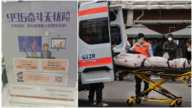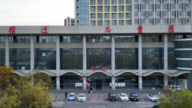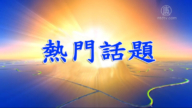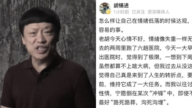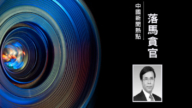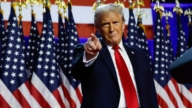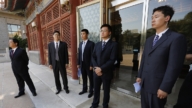【新唐人2011年12月1日訊】衡量一個國家的強盛興衰除了要有硬指標,還要有軟實力。有大陸學者指出,中國目前擁有核彈,氫彈和航母,GDP排名世界第二,用這些硬指標來比較的話,台灣確實比不上。不過,在政治,思想和文化的自由度等軟實力方面,北京則輸了。
台灣立法院11月8號三讀通過了「國家安全法部分條文修正案」,刪除了「人民集會結社,不得主張共產主義或分裂國土」和「人民入出境,應向警政署入出境管理局申請許可;未經許可者,不得入出境」的條款。這個修正案有待總統宣佈後生效。
台灣中山大學社科院院長林文程教授表示,這個立法修正案,台灣把它歸為言論自由。
台灣中山大學社科院院長林文程教授:「中國大陸的學者在台灣這麼多,中國在台灣出版的書籍也這麼多,這些書籍的都是在宣傳共產主義,那你是不是要去禁它,你要不要把這些人抓起來。一個民主制度的國家你就要去保障人民的集會、結社跟言論的自由。台灣是一個民主制度的國家,本來就是要這樣的。」
法學家袁紅冰教授認為,台灣的修憲是有進步意義的。
法學家袁紅冰:「它表明台灣的自由民主已經趨於成熟,法律相信人民有能力去判別甚麼是對的,甚麼是錯的,也相信人們有權力去做出自己的選擇。反觀中國的罪案,他們反而要以甚麼國家的力量,整個國家機器的力量去宣揚社會主義。這意味著甚麼?意味著他們仍然要用一個國家的暴力,國家恐怖主義性質的國家權力去推動,給人類帶來巨大災難的這樣一種思潮。」
目前,距離明年1月台灣大選只剩一個多月,選舉進行得熱火朝天,國民黨、民進黨、親民黨紛紛登臺亮相,各出奇招。各界媒體報導也緊隨其後,兩黨的候選人被炒翻了天,選舉中發生的每一個吸睛細節,新聞媒介都不捨得放過。
反觀中國大陸,基層人大代表換屆也正在北京、上海、福建、貴州、廣東等地進行,當局一直在阻撓獨立候選人參選,不斷傳出獨立參選人被打壓的消息。獨立參選人進行選舉演講、與選民互動、張貼選舉資料都被當局粗暴的干擾。很多候選人最終被踢出局,有的參選申請則「石沉大海」。
此外,在今年中共六中全會上通過的「關於深化文化體制改革,推動社會主義文化大發展大繁榮」的文件中,找不到「自由」兩個字,而出現頻率最高的字眼是「社會主義」,「高舉中國特色社會主義旗幟」等。
台灣中山大學社科院院長 林文程教授:「民主化的改革,從言論自由和思想自由這方面,你要容忍不同的聲音對你的批評、對你的批判,有時候甚至是辱罵。如果說你要推動思想解放、言論自由,那你,就是當政者要有這個雅量,接受別人對你的批判。」
明年中共將舉行十八大,更換新一屆領導人。大陸學者姚監復發表在《德國之聲》的文章預測,黨的總書記兼國家主席、軍委主席或第一副主席習近平將毫無懸念的當選,因為沒有競爭對手。
他認為,在2012年的兩岸領導人選舉的民主程序的優劣比賽中,共產黨已經輸了,國民黨已經贏了。
他指出,不論誰當選,全國老百姓看清了,誰真正講民主,誰的軟實力更強:誰能輸得起,下臺又能上臺;誰怕下臺,遭到清算,死抓住權力不放。
新唐人記者梁欣、李靜、黎安安採訪報導。
Compare soft powers with Taiwan—Scholar says: Beijing Has Lost
Hard and soft power can be used to measure
the rise and fall of a country.
Chinese scholars point out that now China has nuclear bombs,
a hydrogen bomb and aircraft carriers, and the world’s second largest GDP.
Taiwan is no match to China’s hard power. However, Taiwan’s
superiority in soft powers, like political freedom, thoughts and culture, is undeniable.
On November 8, Taiwan’s Parliament passed “Amendment
to some of the provisions to the National Security Law."
Some provisions are deleted, like “People must not assemble
and associate to advocate communism or secession,"
and “People must apply for permit from the National Police
Agency in order to enter or leave the country;
an unauthorized person is not allowed to enter or leave
the country."
The amendment will become effective
after the President’s announcement.
Prof. Lin Wencheng, Dean of the School of Social Sciences
at Zhongshan University in Taiwan, thinks the amendment falls into the category of freedom of speech.
Prof. Lin: “Taiwan has many Mainland Chinese scholars,
and many books written by Mainland Chinese.
These books are communist propaganda.
So are you going to ban them? Are you going to arrest them?
In a democratic country, you need to protect people’s rights
to assemble, associate, and speak. Taiwan is a democratic country, it should be this way."
Law Professor Yuan Hongbing said that Taiwan’s
constitutional Amendment is a sign of progress.
Prof. Yuan: “This shows that freedom and democracy
have matured in Taiwan.
The law trusts that people have the ability to distinguish
right from wrong. It also gives people the right of choice.
On the other hand we have China. Its authorities always use
the state power and the state apparatus for socialist propaganda.
What does this mean? They still use state violence
and state terrorism to push forward the ideology that brings enormous disasters to mankind."
Now is less than two months from Taiwan’s presidential
elections in January 2012. Election campaigns are in full swing.
KMT, DPP and PFP are using various means to attract voters.
Media reports closely follow the details of the campaigns.
Elections for the grass-root people’s representative in China
are also taking place.
However, the authorities have been obstructing independent
candidates to participate in the elections.
Numerous independent candidates are being suppressed.
Independent candidates who gave election speeches,
interacted with voters and posted election materials, were violently interfered with by the authorities.
Some candidates were eventually kicked out.
Some candidates’ applications “have gone missing" since.
The Chinese Communist Party’ (CCP) 6th Plenary Session
this year passed a resolution to “deepen cultural restructuring and promote development and prosperity of socialist culture."
The document does not mention the word “freedom,"
however, it frequently uses the term “socialism," and “upholding socialism with Chinese characteristics."
Prof. Lin: “Democratic reforms include allowing
freedom of speech and freedom of thought.
You need to tolerate different opinions, including criticism
and sometimes even abusive language.
If you are to promote emancipation and freedom, as authority
you need to have tolerance and accept criticism from others."
The CCP will hold its 18th National Congress next year,
after which it will have a new leadership.
Chinese scholar Yao Jianfu wrote for Deutsche Welle,
that he thinks Xi Jinping will become CCP’ General Secretary,
Central Military Commission’ Chairman and China’s President.
Yao believes, that the 2012 elections in China and Taiwan
will show that the CCP has lost, with KMT winning.
Yao pointed out that no matter who wins the elections,
the citizens will be able to see who is truly democratic,
who’s soft power is stronger, who can afford to lose,
and who is afraid to lose and afraid to be brought to justice.
NTD reporters Liang Xin, Li Jing and Li Anan.


